Themed collection ChinaNANO

Controlled formation of GeSi nanostructures on periodic Si (001) sub-micro pillars
Quantum rings, quantum dot molecules and quantum dots obtained at the edge of sub-micro pillars by controlling the pillar diameters.
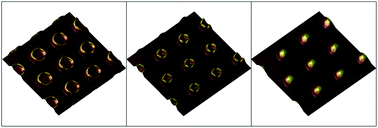
Nanoscale, 2014,6, 3925-3929
https://doi.org/10.1039/C3NR04146H
Strong anti-ice ability of nanohairs over micro-ratchet structures
Nanohair surfaces on ratchet-tunable surfaces achieve an excellent anti-ice effect. Especially, the sample with a micro-structure (periods of ∼290 μm) and nanohairs (100 ± 30 nm in diameter) may achieve a longer freezing delay with a low temperature of −10 °C and reversible water repellency.
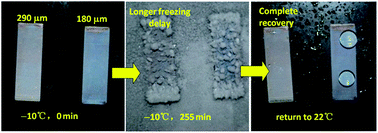
Nanoscale, 2014,6, 3917-3920
https://doi.org/10.1039/C3NR04061E
Power generation from water flowing through three-dimensional graphene foam
Electricity is induced when water flows through three-dimensional graphene foam, and the induced current becomes larger as the flow velocity increases.
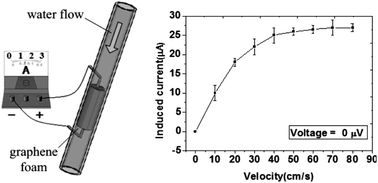
Nanoscale, 2014,6, 3921-3924
https://doi.org/10.1039/C3NR04261H
Angular dependence of the magnetoresistance effect in a silicon based p–n junction device
Anisotropic MR effect is seen in a non-magnetic p–n junction due to the space charge region being modulated by an external magnetic field.
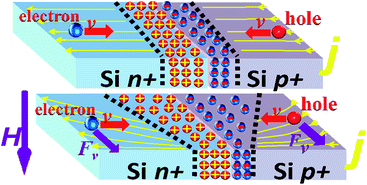
Nanoscale, 2014,6, 3978-3983
https://doi.org/10.1039/C3NR04077A
Facile preparation of transparent and dense CdS–silica gel glass nanocomposites for optical limiting applications
Our strategy involves a two-step sol–gel process and the co-condensation of the resulting alkoxysilane-capped CdS QDs with other alkoxysilanes.
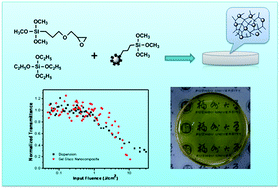
Nanoscale, 2014,6, 3972-3977
https://doi.org/10.1039/C3NR05424A
Facile colloidal coating of polystyrene nanospheres with tunable gold dendritic patches
Patchy particles comprising gold dendrites on cationic polystyrene nanospheres can be produced via a simple colloidal approach. With the aid of experiments and simulations, the patch growth mechanism is investigated.
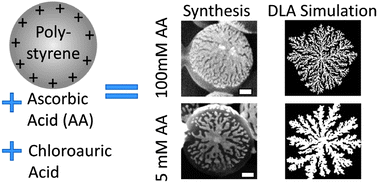
Nanoscale, 2014,6, 3954-3966
https://doi.org/10.1039/C3NR04016J
Microwave absorption properties of core double-shell FeCo/C/BaTiO3 nanocomposites
Core double-shell FeCo/C/BaTiO3 nanocomposites with rich interfaces show better electromagnetic impedance matching, resulting in excellent microwave absorption properties.
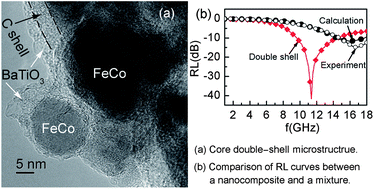
Nanoscale, 2014,6, 3967-3971
https://doi.org/10.1039/C3NR04087A
Temperature dependent Raman spectra of isolated suspended single-walled carbon nanotubes
Temperature-dependent Raman RBM, G and G’ band frequency redshift and linewidth increase of suspended individual SWCNTs in 240-600 K to get their instinct physical properties.
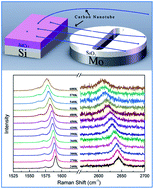
Nanoscale, 2014,6, 3949-3953
https://doi.org/10.1039/C3NR04405J
Towards controllable growth of self-assembled SiGe single and double quantum dot nanostructures
Controllable growth of lateral SiGe double QDs on nanohole-patterned Si (001) substrates with various interdot spacings and dot sizes was realized via molecular beam epitaxy.
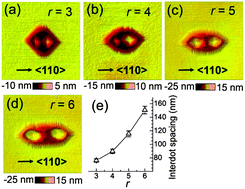
Nanoscale, 2014,6, 3941-3948
https://doi.org/10.1039/C3NR04114J
Multipole plasmon resonances in self-assembled metal hollow-nanospheres
Multipole plasmon resonances are realized in self-assembled Ag hollow nanospheres with a uniformly enhanced local field in the gaps through the inter-coupling effect.
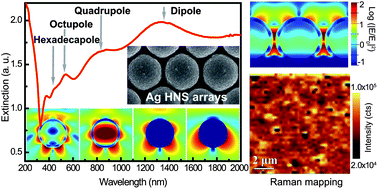
Nanoscale, 2014,6, 3934-3940
https://doi.org/10.1039/C3NR04106A
Strain sensors based on chromium nanoparticle arrays
Chromium nanoparticle arrays can be used as high-performance strain sensors. The sensing mechanism of such sensors is based on quantum transport.
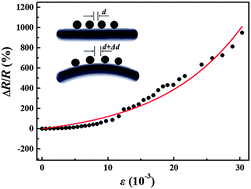
Nanoscale, 2014,6, 3930-3933
https://doi.org/10.1039/C3NR04135B
Mechanical properties of PGA at different water fractions – a molecular dynamics study
The mechanical properties of polyglycolic acid (PGA) of different water weight fractions (1.7%, 2.9%, and 5%) were investigated by molecular dynamics (MD) simulation through a tensile test.

RSC Adv., 2014,4, 12710-12715
https://doi.org/10.1039/C4RA00484A
Investigation of the fracture mechanism of Cu–Al gradient structure
The mechanical properties of a Cu–Al gradient structure obtained from a tensile test have been investigated by molecular dynamics simulation.
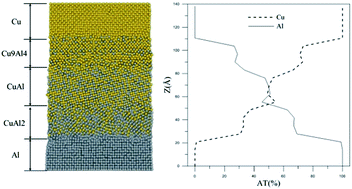
RSC Adv., 2014,4, 11975-11979
https://doi.org/10.1039/C3RA46207B
Mechanical property prediction of starch/polymer composites by molecular dynamics simulation
Molecular dynamics (MD) simulation was used to investigate the mechanical properties of several starch composites.

RSC Adv., 2014,4, 11475-11480
https://doi.org/10.1039/C3RA46213G
Mechanical properties and thermal stability of ultrathin tungsten nanowires
The most stable structures of three ultrathin tungsten nanowires were predicted by the simulated annealing basin-hopping method (SABH) with the penalty algorithm.
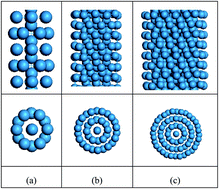
RSC Adv., 2014,4, 6985-6990
https://doi.org/10.1039/C3RA46215C
About this collection
This themed issue features a collection of articles from the ChinaNANO conference celebrating the 10th anniversary of the National Center for Nanoscience and Technology (NCNST). This is a cross-journal collection featuring articles from Nanoscale and RSC Advances.